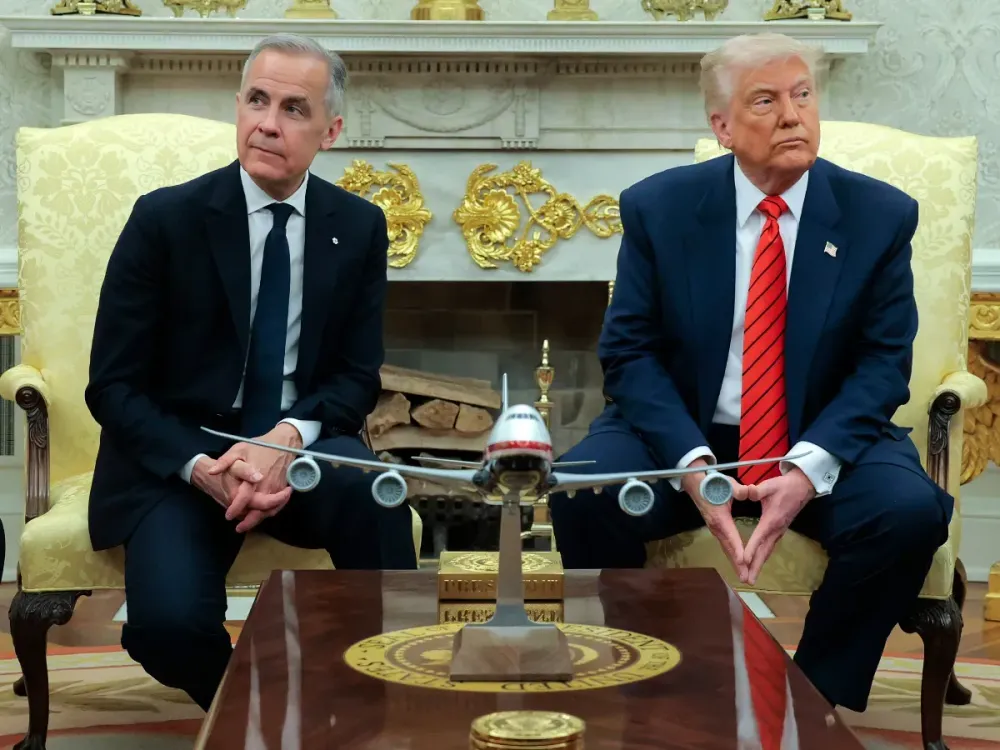Advertisement|Remove ads.
Trump, Carney Signal USMCA Rewrite With Auto Trade Tensions in Focus — Country ‘Not for Sale,’ Canada Tells US

The future of the U.S.-Mexico-Canada Agreement (USMCA) was one of the key points of discussion during Tuesday’s White House meeting between President Donald Trump and Canadian Prime Minister Mark Carney, as both leaders signaled that the deal would be subject to changes.
Trump said the agreement was “good for all countries” but added that talks to update and revise the pact were likely. Carney, echoing that sentiment, said the USMCA would serve as a “basis for a broader negotiation,” noting that “some things about it are going to have to change.”
The agreement, which governs over $1.5 trillion in annual trade across North America, became a renewed point of contention amid Trump’s tariff-focused economic policy and efforts to reindustrialize key sectors such as autos.
When Trump imposed a 25% tariff on imports from Canada and Mexico, citing “an extraordinary threat posed by illegal aliens and drugs,” the countries accused the U.S. of violating the terms of the USMCA.
Tuesday’s data shows Canadian exports to the U.S. dropped by 6.6% in March, while imports from the U.S. fell by 2.9%.
During the discussion between Trump and Carney, auto supply chains in particular emerged as a friction point. Carney praised the benefits of binational manufacturing and shared production networks, while Trump argued that the U.S. should aim to repatriate auto jobs.
“We want to make our own cars. We don’t really want cars from Canada,” Trump said. “We put tariffs on cars from Canada, and at a certain point, it won’t really make economic sense for Canada to build those cars.”
The impact of Trump’s tariffs on U.S. automakers has been swift. Ford (F) warned the tariffs could cost the company $2.5 billion in fiscal 2025. General Motors (GM) revised its profit outlook lower, estimating a $5 billion hit. Stellantis (STLA) withdrew its full-year guidance after reporting a decline in first-quarter revenue.
Despite these differences, the tone of the meeting remained largely cordial. Carney called Trump a “transformational” leader, and Trump congratulated Carney for what he described as “one of the greatest comebacks in the history of politics.”
Trump also floated the idea of Canada becoming a U.S. state. “It would really be a wonderful marriage,” he said. Carney dismissed the notion flatly, stating, “It’s not for sale, it won’t be for sale—ever,” as Trump responded with a grin, saying, “Never say never.”
U.S. benchmark indices recorded losses on Tuesday as investors awaited Fed Chair Jerome Powell’s comments on monetary policy and the economic climate.
The SPDR S&P 500 ETF Trust (SPY), which tracks the S&P 500, traded 0.89% lower on Tuesday afternoon, while the Invesco QQQ Trust, Series 1 (QQQ), which tracks the Nasdaq Composite, was over 1%. The SPDR Dow Jones Industrial Average ETF (DIA) dipped 0.98%.
Meanwhile. Ford's stock was up 2.7% and General Motors shares rose 0.3%. Stellantis' stock was down 0.58%.
For updates and corrections, email newsroom[at]stocktwits[dot]com.
Read also: Take-Two Stock Gains On Surprise GTA VI Trailer Despite 2026 Delay













/filters:format(webp)https://news.stocktwits-cdn.com/large_Novo_Nordisk_jpg_96dd19f953.webp)
/filters:format(webp)https://st-everywhere-cms-prod.s3.us-east-1.amazonaws.com/Rounak_Author_Image_7607005b05.png)
/filters:format(webp)https://news.stocktwits-cdn.com/Getty_Images_2203832195_jpg_d80f13d1c7.webp)
/filters:format(webp)https://st-everywhere-cms-prod.s3.us-east-1.amazonaws.com/IMG_9209_1_d9c1acde92.jpeg)
/filters:format(webp)https://news.stocktwits-cdn.com/large_opendoor_OG_jpg_55300f4def.webp)
/filters:format(webp)https://news.stocktwits-cdn.com/large_Getty_Images_2262161352_jpg_832967dbca.webp)
/filters:format(webp)https://news.stocktwits-cdn.com/large_capricor_jpg_9f4f8ab098.webp)
/filters:format(webp)https://news.stocktwits-cdn.com/IMG_8805_JPG_6768aaedc3.webp)
/filters:format(webp)https://news.stocktwits-cdn.com/large_bitdeer_OG_jpg_8f9fd0249d.webp)
/filters:format(webp)https://st-everywhere-cms-prod.s3.us-east-1.amazonaws.com/Prabhjote_DP_67623a9828.jpg)